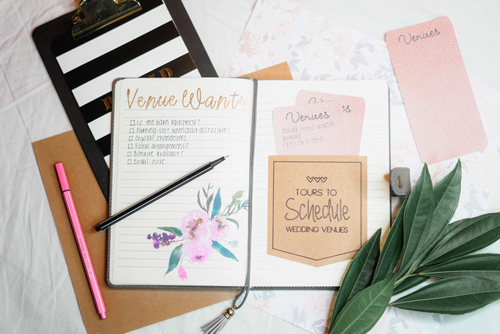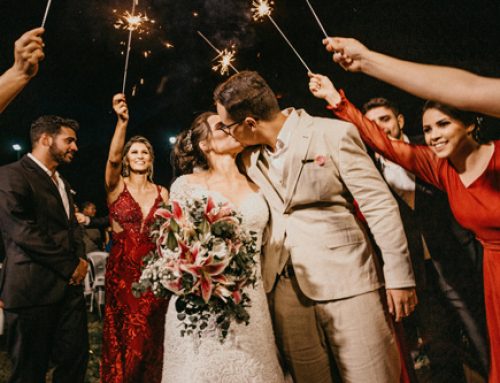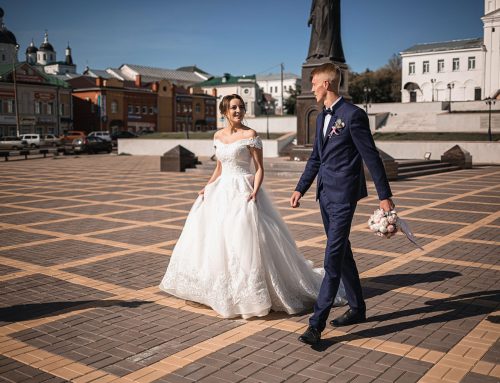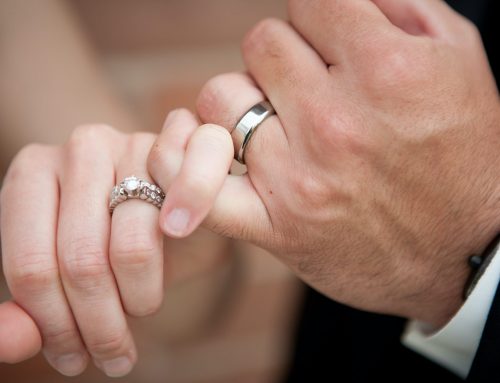It’s no secret that planning a wedding is a lot of work. Due to guest lists, venues, music, food, and a seemingly endless list of other things to consider, preparing for even a relatively simple wedding can be quite stressful.
According to a survey by Zola, around 40% of couples used the terms “very” and “extremely” to express wedding planning stress. This number is likely even higher for those planning more complicated weddings.
Still, there are some measures you can take to help reduce some of the stress surrounding your big day. Staying calm requires a good balance of preparation, flexibility, and organization. If you can keep these things in mind, you should have a head start on a less stressful wedding day.

Why Is Wedding Planning So Stressful?
There are several reasons why wedding planning can be so tricky, from trying to please everyone to ensuring everything is perfect on the big day.
One of the biggest causes of wedding stress is often the financial burden of a wedding. The wedding industry has always been pricey — couples and families are willing to spend more money since weddings are a once-in-a-lifetime event.
After the COVID-19 pandemic, weddings are even more expensive as demand surges with all the couples rushing to get married now that large group gatherings are safe. In 2022 alone, 2.5 million couples planned to host a wedding, which is a 30% increase from previous years. To properly respond to this inflated market and save money, couples inevitably have to cut costs to meet their budget, which may spur arguments and anxiety.
Another significant source of stress is often the guest list. Couples may have disagreements over who to invite or may be worried about offending people if they don’t invite them. This can also cause arguments and a lot of anxiety.
Couples may also be worried about the weather, the food, or alleviating conflict between disagreeing wedding guests. This is all perfectly normal, but it can still be very overwhelming.
If you’re feeling stressed about your wedding, you can do a few things to prevent wedding anxiety.
Plan Everything Out
To avoid this inevitable stress, dedicate more time to planning. However, planning in and of itself can be a huge source of wedding stress without proper care.
Wedding planning is a big job, and there’s a reason wedding planners are part of a job sector the U.S. Bureau of Labor Statistics expects to grow nearly 20% over the next decade. If you can afford to hire a wedding planner, that can be a huge reduction of stress, but you should be sure it fits into your budget.
If a wedding planner doesn’t fit into your budget, make sure to delegate tasks to your wedding party and family members. Everyone wants to see you shine on your wedding day and most will be more than willing to help out in the lead-up to the big day.
Know Your Budget
As mentioned, weddings are notoriously expensive, and the costs continue to rise with time and inflation. As of 2021, the average wedding in the United States cost $30,000. Still, an average is just an average, and it is possible to spend much less or much more depending on your vision and budget for the day.
Even when you’re able to cut down on costs, things like venue, rings, and food will all cost money, so you need to have a plan for ensuring you stay within your means. Coming up with your budget early on can guide the rest of your wedding planning process and help reduce stress along the way.
Make a Checklist
Using checklists to keep track of your wedding preparation can make it fun and satisfying to get ready for the big day. In addition to helping itemize the things that still need to be done, it can also provide a sense of accomplishment as you check things off of the list. It is especially helpful to customize to-do lists for the bride and for the groom respectively. Seeing fewer and fewer items remaining on the list is also a great way to reduce stress.
A checklist is another way to plan out how much time or money each part of the wedding will cost. Sitting down with your partner early on and discussing each component can be a good way to come up with ballpark figures and begin to envision how your wedding day will look.
Consider the Importance of Each Item on Your Checklist
On your wedding day, some aspects have greater importance than others. For example, no one will notice if the reception tablecloth is the wrong shade of off-white, but everyone will notice if the bride is dressed in pajamas. As early as you can, consider the various factors of your wedding and how important each one is to you and your partner.
High Importance Items
A wedding is made up of many traditions, amenities, and activities, and some are more important than others. Determine which items are essential to your wedding, and make them a priority. These items will likely vary from couple to couple, but most weddings will have some of the same high-importance considerations, such as:
- The rings: Rings are likely an important part of your wedding ceremony, so they should be given high priority. Nevertheless, rings don’t need to be a significant source of stress. The key points are to know how much you are willing to spend on the rings, and to pick styles you love. Shopping through all the designs of men’s and women’s rings can be a fun part of the process that reduces stress.
- Wedding party clothes: Whether your wedding will be formal or casual, it is still a necessity to figure out what your wedding party is going to wear. Remember that it may take some time to find the perfect outfits and rental services can run out, so it’s best to start early. The sooner you can find clothes for the wedding party, the sooner you can stop stressing about it.
- Venue: One of the most important aspects of a wedding is where it will take place. This should be an early consideration since popular wedding venues can get booked up quickly. Making this an early priority can help save a lot of stress down the road as the day approaches. Certain venues also provide services for weddings, such as catering, which may increase your costs but can lessen your stress on your wedding. Establish early on if this is something you desire and pick your venue from there.
Low Importance Items
There are some aspects of a wedding that, though still important, are less important than the high-priority items. These are items that aren’t showstoppers, and can be given less care than the high-importance items. By limiting the items of great concern, you can easily reduce some significant sources of stress. Examples of low-importance items include:
- Reception seating charts: While it may be important to you that your guests are seated appropriately, this is something that you shouldn’t stress too much over. It’s probably a good idea to assign general tables for immediate family, but if you don’t get around to planning any further, the rest of the guests can naturally figure out where to sit. This can save you time and stress, so you can think about more important matters. However, if you know there will be a conflict between certain guests if they are sitting near each other, making arrangements to avoid that drama can prevent stress down the road.
- Weather: It is unfortunate to plan for a beautiful outdoor wedding only to look at the forecast and see an all-day thunderstorm. For this reason, you should consider having a backup plan for stormy weather, but don’t spend time in the preceding weeks and months worrying about what the weather will be like.
Manage Your Expectations
Planning a wedding can be exciting, but it can also cause a lot of tension and stress. One way to avoid this is to manage your expectations. Accept that there may be some things you’re unhappy with, and don’t sweat the small stuff.
It’s also important to communicate with your partner about your expectations. If you’re both on the same page, making decisions and staying organized will be easier. Try to discuss your wedding plans regularly and be open to compromise.
If these issues are not managed, they can lead to bigger problems down the road such as unhealthy coping mechanisms, resentment, and even divorce. One study even found that couples with less stress around the time they got married were more likely to have satisfying relationships 10 years later. As such, you should deal with your stress head-on and communicate with your partner about it.
It’s your wedding day, and you want it to be perfect, but it’s okay if it isn’t. Understand that it’s not the end of the world if something goes wrong. After the day is done, none of the minor mishaps will matter, and hopefully, the day will be full of memories that you will both cherish forever.





Leave A Comment